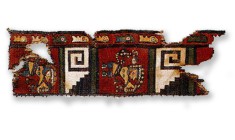Neil Brodie in Amsterdam
27 Mar 2014

Neil Brodie will be in Amsterdam to give two lectures during the first week in April. On 2 April at 3.00 pm he will present the lecture ‘Scholars and criminals: the study and publication of looted cuneiform tablets from Iraq’ at the Allard Pierson Museum. This will be followed on 3 April at 3.30 pm with ‘Criminal capers or professional practice? Museums and the antiquities trade’, also at the Allard Pierson Museum. Abstracts below.
Scholars and criminals: the study and publication of looted cuneiform tablets from Iraq
The archaeological sites and museums of Iraq have been plundered continuously since the end of the 1991 Gulf War. Thousands upon thousands of cuneiform tablets have been illegally excavated and exported to feed large new private collections of cuneiform tablets in Europe and North America. These illegally-traded tablets have been shorn of archaeological context are now being studied and brought to publication by university-based scholars, though not all scholars agree that this should happen. Opinions are divided as to the ethical propriety and commercial impact of such study. This talk will describe the history of looting and collecting of cuneiform tablets since 1991 and consider the different and sometimes opposing viewpoints in the debate over their study and publication.
Criminal capers or professional practice? Museums and the antiquities trade
Since the 1990s, Carabinieri investigating the illegal trade of antiquities out of Italy have exposed the central and sometimes intimate involvement of museums and their curatorial staff. Several major art museums in the United States have been forced to deaccession important acquisitions and return them to Italy without any financial recompense. The story is now repeating itself with the arrest in India and associated investigations in the United States of a prominent dealer in Indian antiquities, and major art museums have once more been caught in possession of illegally-traded pieces. Italy brought criminal charges against the antiquities curator of the J. Paul Getty Museum in Los Angeles, but within the museums’ community the problem has been tackled as one of ethical shortcoming rather than of criminal malpractice. New acquisitions guidelines make stronger recommendations for acceptable provenance of prospective acquisitions and standards of due diligence when investigating provenance. From a criminological perspective, however, these stronger requirements as regards provenance may not be enough to protect museum curators from the actions of criminals. This lecture will review the involvement of museums with the illegal trade in antiquities, as exposed by the recent criminal investigations of Italian and Indian dealers, and examine how their curatorial staff may still be vulnerable to criminal exploitation.
